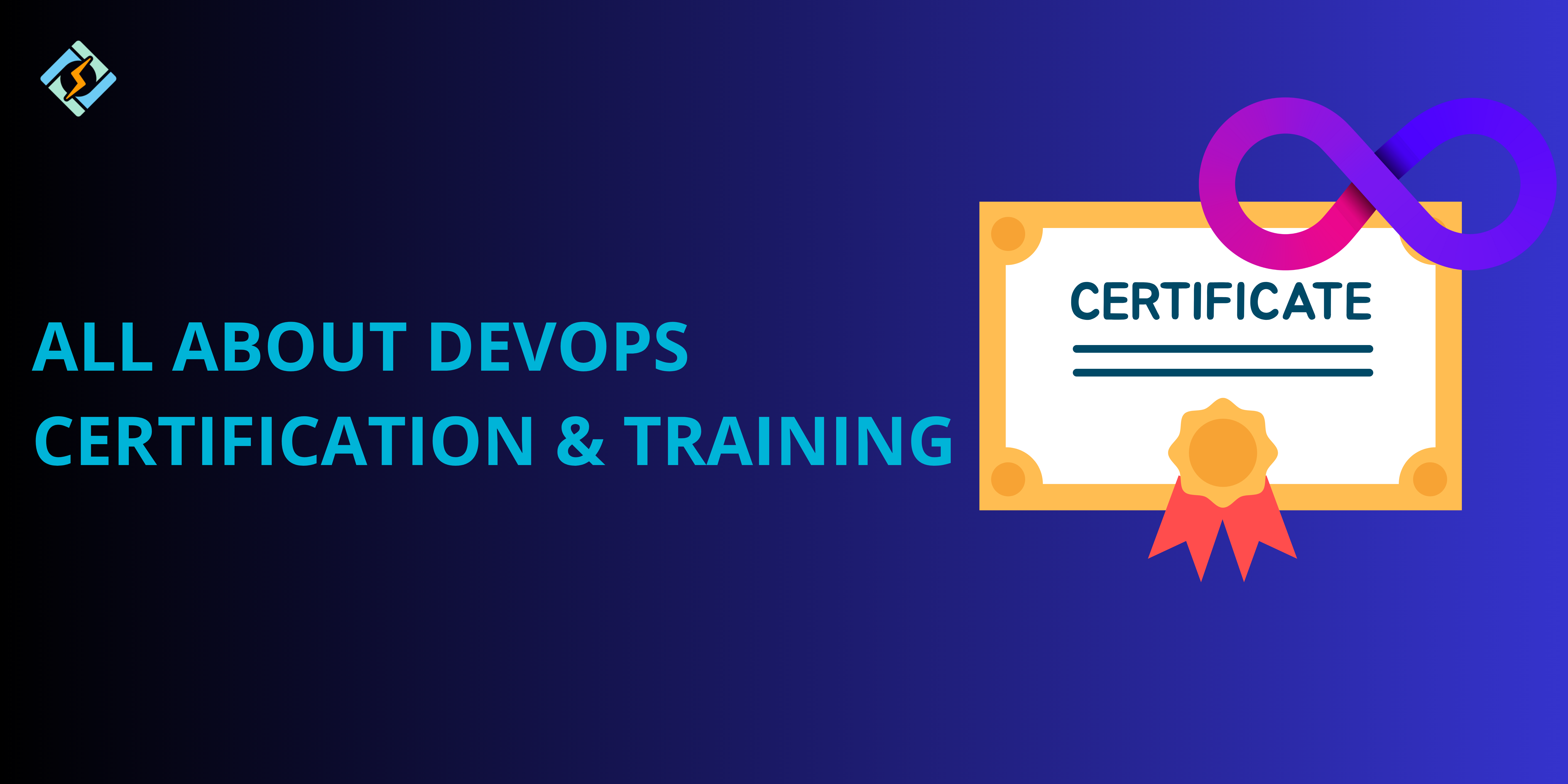DevOps training has become crucial for IT professionals, certified professionals is in high demand. It focuses on bringing together and automating various processes, with DevOps engineers playing a key role in merging code, maintaining applications, and managing them effectively.
As more organizations embrace DevOps practices, the demand for certified professionals is skyrocketing. With so many training programs and certifications available, how do you choose the right one?
This guide will help you navigate the world of DevOps training, highlight the top certifications, and point you in the right direction for your career.
What is DevOps Training?
DevOps training teaches IT professionals the strategies, tools, and frameworks needed to integrate development (Dev) and operations (Ops). The curriculum covers areas like automation, CI/CD, cloud computing, containerization, and infrastructure as code (IaC). Whether you’re just starting out or you’re an experienced engineer, the skills you gain can enhance collaboration, boost efficiency, and streamline software releases.
Why is DevOps Certification Important?
Getting a DevOps certification shows that you know your stuff and can effectively implement DevOps best practices in real-world scenarios. Here are some advantages of earning a certification:
- Improve your job prospects and advance your career
- Increase your earning potential
- Gain expertise in leading DevOps tools
- Be recognized as a DevOps professional
- Follow a structured learning path to master DevOps
Who Should Consider DevOps Training?
DevOps training is ideal for:
Get exclusive access to all things tech-savvy, and be the first to receive
the latest updates directly in your inbox.
- Software Developers aiming to automate tasks and integrate CI/CD pipelines.
- System Administrators and IT Engineers want to enhance cloud infrastructure.
- Cloud computing courses trained engineers looking to deepen their understanding of DevOps methodologies.
- Project Managers and IT Leaders overseeing DevOps transformations.
- Security Engineers adopting DevSecOps practices.
Top DevOps Certifications in 2025
Here are some very useful DevOps training certifications for IT professionals looking to upscale their skills:
1. AWS Certified DevOps Engineer
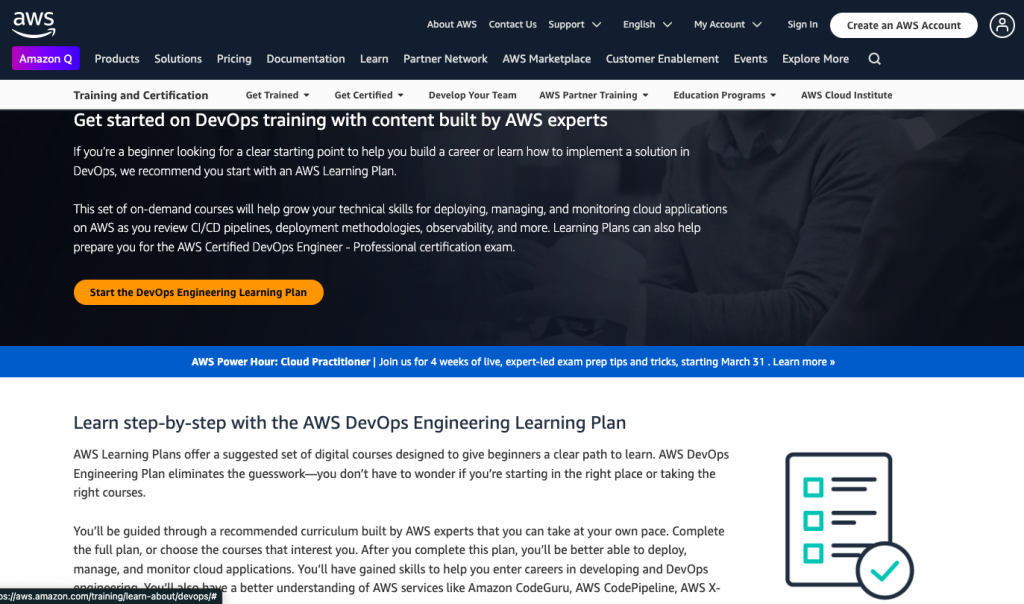
AWS DevOps training certificate, Learning Plans: A Straightforward Guide for Newcomers
- Offers a structured approach for beginners to explore digital courses.
- The AWS DevOps Engineering Plan removes uncertainty.
- Follow a suggested curriculum designed by AWS professionals.
- Complete courses at your own speed or based on your interests.
- Develop skills in deploying, managing, and monitoring cloud applications.
- Learn about about DevOps with AWS training services such as Amazon CodeGuru, AWS CodePipeline, and AWS X-Ray.
- AWS specialists have developed a downloadable guide to assist in navigating DevOps resources and content.
2. Cloud DevOps Engineer Professional Certificate
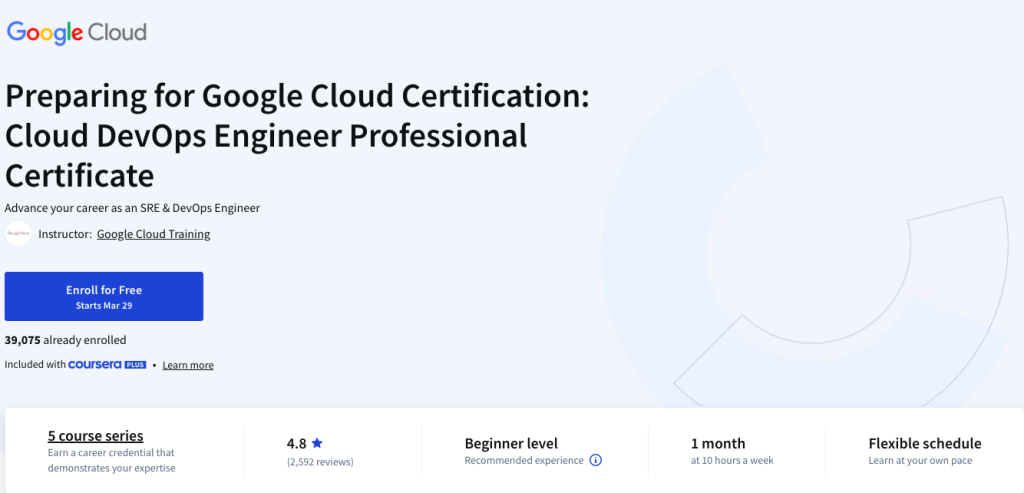
Google Cloud Professional DevOps Engineer Program Summary
- Applied Learning Project: Features hands-on labs on the Qwiklabs platform to apply skills gained from video lectures.
- Equips data engineers with the necessary skills and prepares them for the Google Cloud Professional DevOps Engineer certification.
- 87% of users certified by Google Cloud report increased confidence in their cloud abilities.
- Focuses on essential job skills through Google Cloud, covering software delivery pipelines, service deployment, monitoring, incident management, and performance enhancement.
- The path to Google Cloud certification involves completing the Coursera Site Reliability Engineering and DevOps Professional Certificate, exploring learning materials, taking a practice exam, and signing up for the certification test.
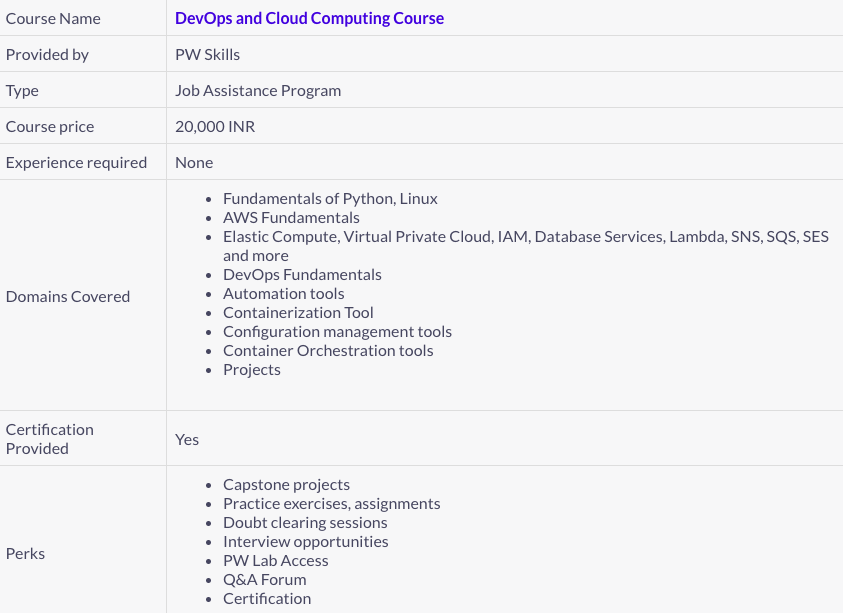
3. Docker Certified Associate (DCA)
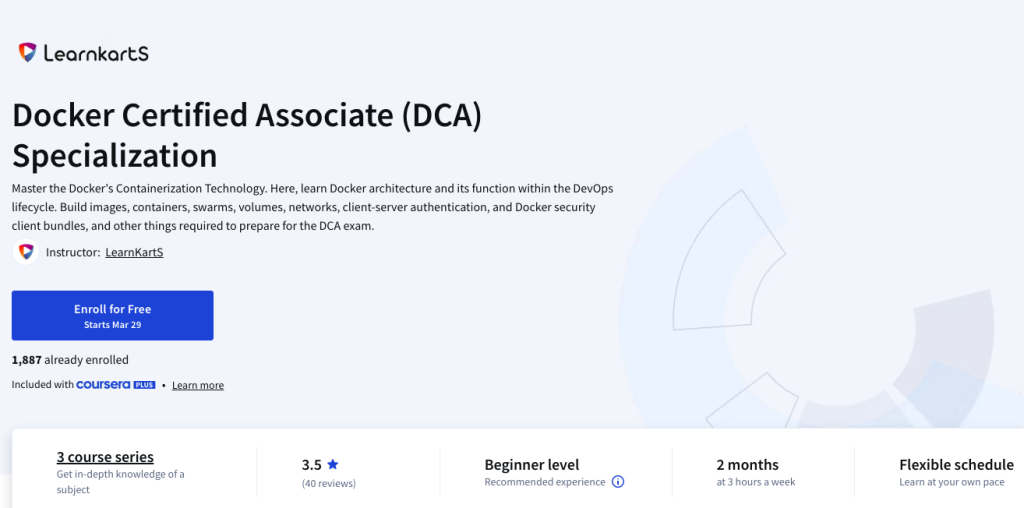
This Docker training certificate lets you:
- Create images, containers, swarms, volumes, networks, and manage client-server authentication and security bundles.
- Learn about Docker implementation, how to manage images, create Dockerfiles, oversee container lifecycles, and apply configuration methods.
- Grasp Docker networking, orchestration, storage solutions, and security measures for efficient management of containerized applications.
- Comprehend Docker security, including container security, authentication processes, and access control.
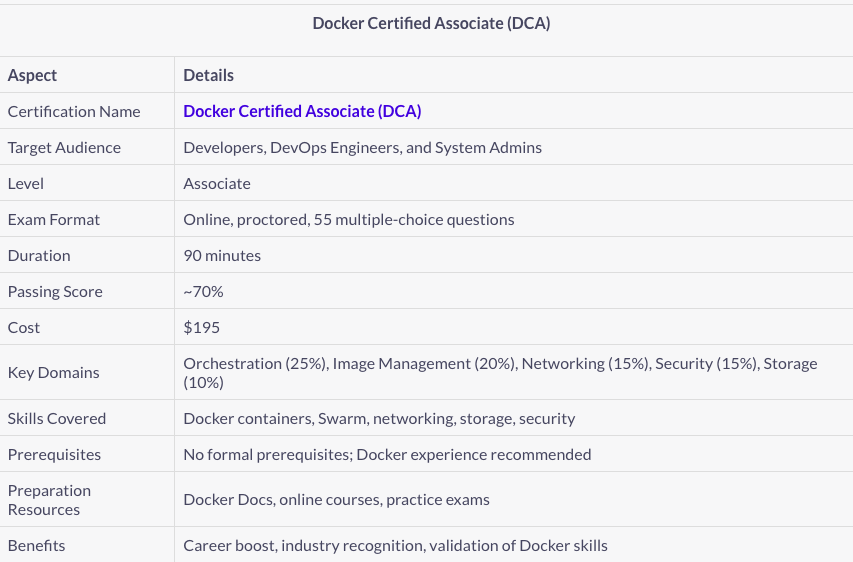
4. Kubernetes Certifications (CKA, CKAD, CKS)
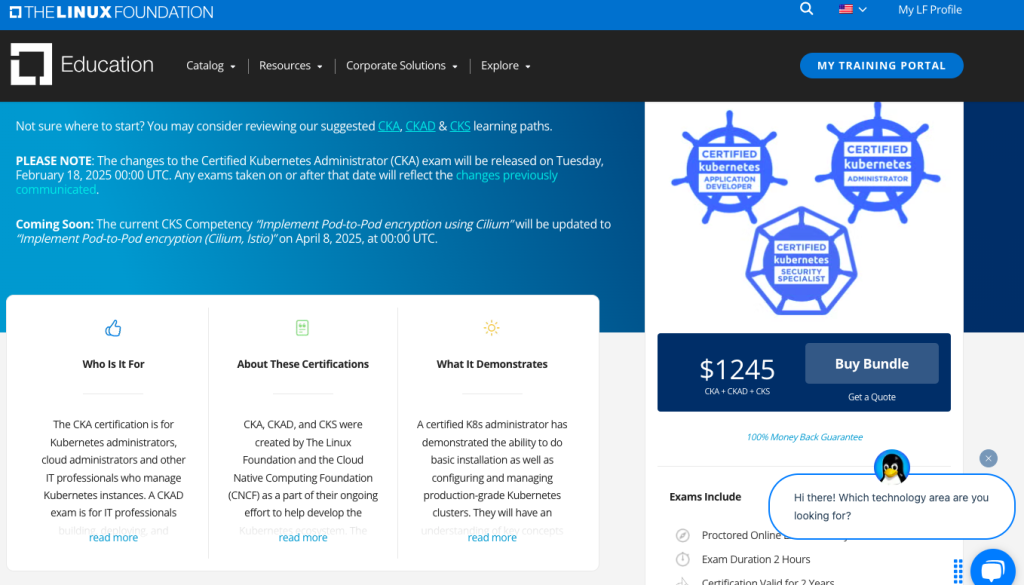
Overview of Kubernetes Certifications
• Developed by CNCF and The Linux Foundation to advance the Kubernetes ecosystem.
• Performance-based, proctored, online tests.
• In a realistic, simulated setting, CKS assesses knowledge of cloud security and Kubernetes.
• Prior to taking the Certified Kubernetes Administrator (CKA) exam, candidates must pass it.
• Until CKA certification is received, the purchase of CKS is not planned.
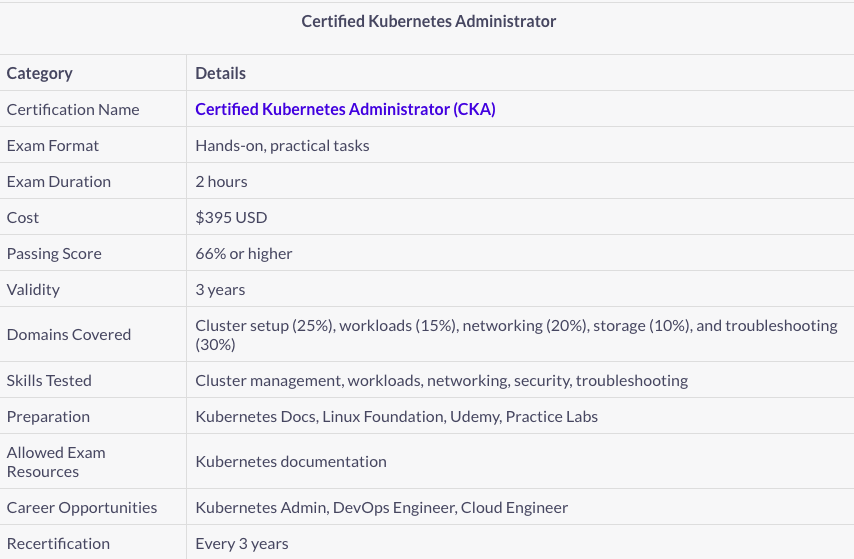
Price: 395$
5. Introduction to Azure DevOps
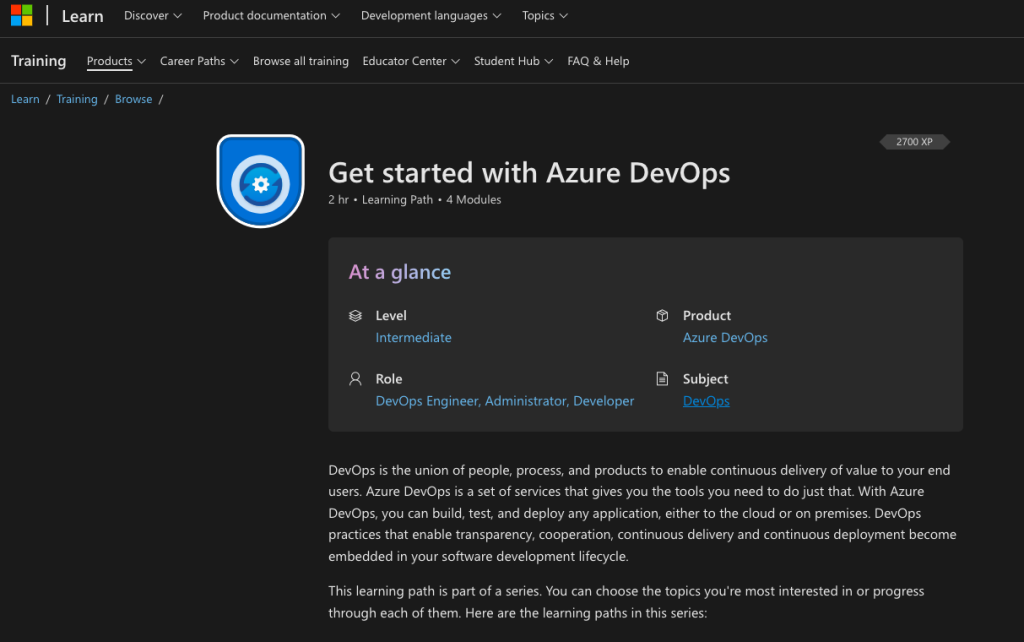
In this learning path, you’ll begin your Azure DevOps training journey. You will:
- Discover how value stream maps can assist in assessing your existing processes and technologies
- Register for a free Azure DevOps organization
- Understand how to plan and monitor work items with Azure Boards
- Enhance sprint workloads among various Agile teams
Building a Successful DevOps Career: More Than Just Training
While training provides essential technical skills, achieving a successful DevOps career involves focusing on several key areas.
Practical Experience: Seek chances to implement your knowledge through personal projects, contributions to open source, or freelance opportunities.
Networking: Cultivate connections within the DevOps community by participating in meetups, conferences, and online discussions.

Ongoing Education: The DevOps field is always changing. Stay updated on the latest technological advancements and trends.
Development of Soft Skills: Strong communication, teamwork, and problem-solving abilities are crucial in the DevOps environment.
The demand for skilled DevOps professionals is growing. By adopting a DevOps mindset, encouraging collaboration, and continuously improving your skills, you can set yourself up for success in this thriving industry. Remember, DevOps is a journey, not a destination. It involves embracing a culture of ongoing learning, enhancement, and delivering value swiftly.
Best DevOps Training Resources
For a successful career in DevOps, think about intense training programs like Udemy, Coursera, edX, and Linux Academy, as well as online courses and bootcamps that accommodate different learning styles and budgets.
Books and Study Resources
- The Phoenix Project by Gene Kim.
- The DevOps Handbook by Gene Kim.
- Site Reliability Engineering by Google.
Free DevOps Training Resources
- AWS Free Training Modules.
- Google Cloud DevOps Learning Path.
- CNCF Free Kubernetes Courses.
How Much Do DevOps Certifications Cost?
DevOps certification costs range from $100 to $600 for beginners and $300 to $600 for those with more experience. Certified professionals can earn 25-30% more than their non-certified counterparts. Salary ranges vary, with junior positions earning between $70,000 and $90,000, while advanced roles can exceed $120,000 to $150,000. To prepare, consider using sample tests, engaging in community discussions, working on hands-on projects, and using AWS Free Tier for cloud training.
Which DevOps Training Path is Best For You?
Recent graduates aiming for a career in DevOps should begin with free DevOps certifications and continue to build on their skills from there. Getting into DevOps can feel a bit daunting, so we’ve put together a comprehensive list of top DevOps training certifications for you. Picking the right one for your needs isn’t too tough. From what we’ve seen, it’s best to begin with a certification that aligns with the tool or platform you’re already familiar with.
What’s crucial is that you gain practical, hands-on experience with the DevOps tool to earn your certification. Dive in, practice, and learn to pave the way for a successful career in DevOps.
FAQ’s
1. Which DevOps training certification is ideal for newcomers?
For those just starting out, the Docker Certified Associate (DCA) and Kubernetes CKAD are excellent options.
2. How long does it typically take to finish DevOps training?
Generally, DevOps courses range from 2 to 6 months, depending on your background and how quickly you learn.
3. Are DevOps certifications beneficial for advancing my career?
Absolutely! Earning DevOps certifications can boost your job prospects and potentially increase your salary by 25-30%.
4. What are some top free resources for DevOps training
Check out AWS Free Training, Google Cloud’s DevOps Learning Path, and the Kubernetes CNCF courses.
5. Is it possible to land a DevOps job without a certification?
Yes, you can, but having certifications can really help showcase your skills and enhance your job opportunities.
